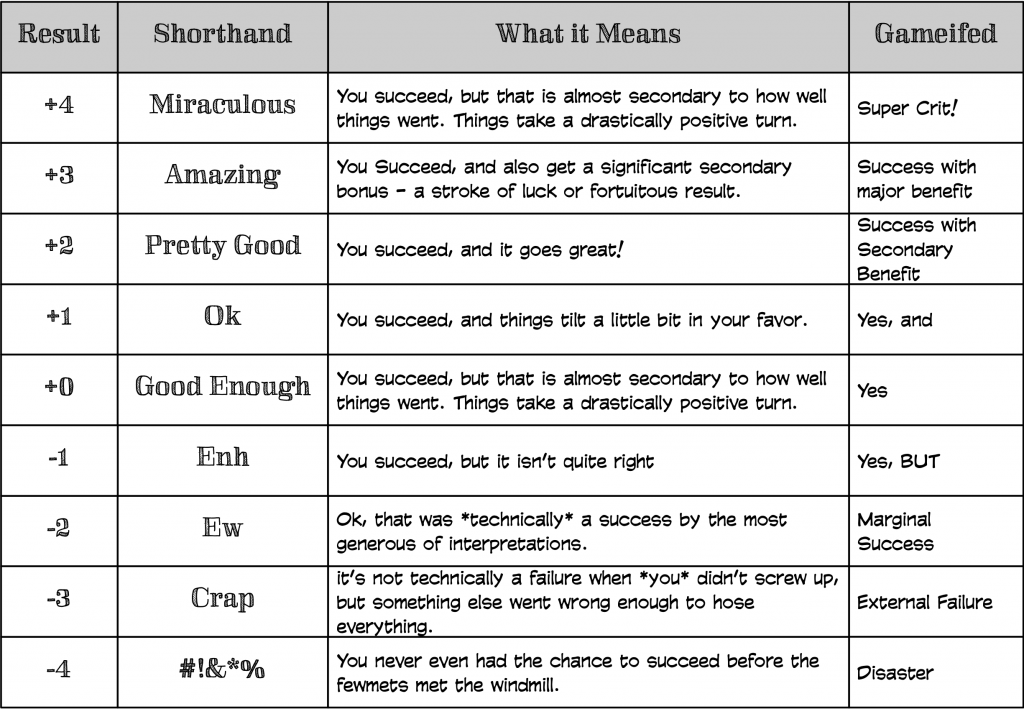I have thought about diceless Fate on numerous occasions, but it’s a hard sell for fairly personal reasons. See, one of the reasons Fate exists is that Fred & I loved the Amber DRPG, but wanted to bring some randomness back into it, for our own sensibilities. Still despite that resistance, the reality has always been that Fate is trivial to convert to diceless play by simple virtue of the 0-centered dice results. If you just assume that all dice rolls come up 0, you’re about 90% of the way to supporting diceless play.
This works ok. Play becomes much more about the exchange of fate points and the impact of aspects, which is kind of fun, but also demands a little bit more precision in the language about where fate points come from and when (thus, the previous post). All solvable problems. But what’s the fun in that?
So I got to thinking about a thing you see in PBTA derived games, where the dice produce flavorful results, but don’t actually take difficulty into account in the rolling. I admit, that sits poorly with me, but it struck me that the idea could be twisted to work by separating the die roll entirely from the question of success or failure.
That is, consider a Fate game where success or failure is determined entirely by whether or not your skill (or approach, or whatever) is equal to or greater than the difficulty of the the task you’re trying. Rules remain the same – treat it like you rolled a zero and keep moving.(fn)
But then add an extra step: Roll the dice for the outcomes.
Now, this is going to be a little counterintuitive for gamers, since we have been trained to consider success/failure to be the outcome, but in this case the question of success has already been resolved dicelessly, so the roll is entirely to determine the other things that the roll would normally handle. The results would be something like (EDIT: NOW WITH THE RIGHT TABLE):
In this system, aspect invocations can be used in two ways:
- to add +1 to the skill or approach (to buy success)
- As die flippers on the roll
Now, it’s worth noting that this is part of what the previous setup was for – in this model, the GM can also use compels to flip dice because that can’t bring failure in the traditional sense, but it can complicate a situation.
OK
Now given that, here’s the really interesting trick. The Press Your Luck mechanic.
If you are facing a situation where you know you’re going to fail, but want to try anyway, you absolutely can. Go ahead and roll the dice. Then remove any plusses you rolled – each plus so removed increases your effective skill/approach by 1.
If that’s enough for you to succeed, then great! Just use the remaining dice to determine your outcome as normal.
If it’s not enough? Well, you still use the result, but replace “Succeed” with “Fail”.
This has been rattling around in my head for a bit now, and I really need to try it out.

(The tables is borked, and needs to be looked at and rectified. No need to publish this comment)
Crap. Stupid file management. Thank you. Will be fixed momentarily.
Why not just 1dF:
+ And …
0 [nothing special]
– But …
Honestly, because people really like 4df.
Personally, I have grown more fond of 2df for almost everything, but it’s an outlier position.
I’ve loved 4dF since the usenet days so it bugs me to no end that in practical Fate like 85% of the time we’re on an 8dF curve since most rolls are opposed ♀️
Also, see the comment below – the idea I failed to articulate well is that practically, -2 to +2 is the actual results range. 3 and 4 results don’t change that so much as provide cues to the GM. I need to articulate that more clearly.
I’m not succeeding in wrapping my head around the difference between these outcomes and the success/failure. Your table includes “You never had the chance to succeed” at the bottom, so it seems to be mapping to success/failure. Is the idea that you’re getting at a graduated set of results, rather than binary success/fail? Isn’t that already covered by existing rules?
I feel like I’m missing something here.
No, you’re getting it, but it’s absolutely a bit weird.
This came from me spending some time thinking about the *sources* of failure (and success) and a disconnect that derives from that. An issue I struggle with in a lot of games is how we respect the idea that the character is capable, but that the dice tell us that they fucked up big. The super-trad way to do it is just say “Well, you fucked up”. The more modern way to do it is to find a way to describe the failure in a way which still respects the character’s competence. This is a further move in that direction.
Specifically, under this model, your characters *competence* is never in question. If you can do a thing, then you can do a thing. It might go better or worse, but I think there’s something intuitively satisfying about that kind of predictability. But since RPGs thrive on the unexpected, there is still space for you to be completely *competent* but for things to go *horribly wrong* for reasons that do not reflect on your competence in the least. The -3 and -4 results are less failures and more “The situation is no changing drastically enough that your previous effort isn’t really relevant.” Ninjas come in through the roof. The alarm goes off. Power cuts out. An explosion goes off.
That said, really, the practical range of outcomes is -2 to +2, and results outside that are cues to the GM to do something. I should probably state that more explicitly.